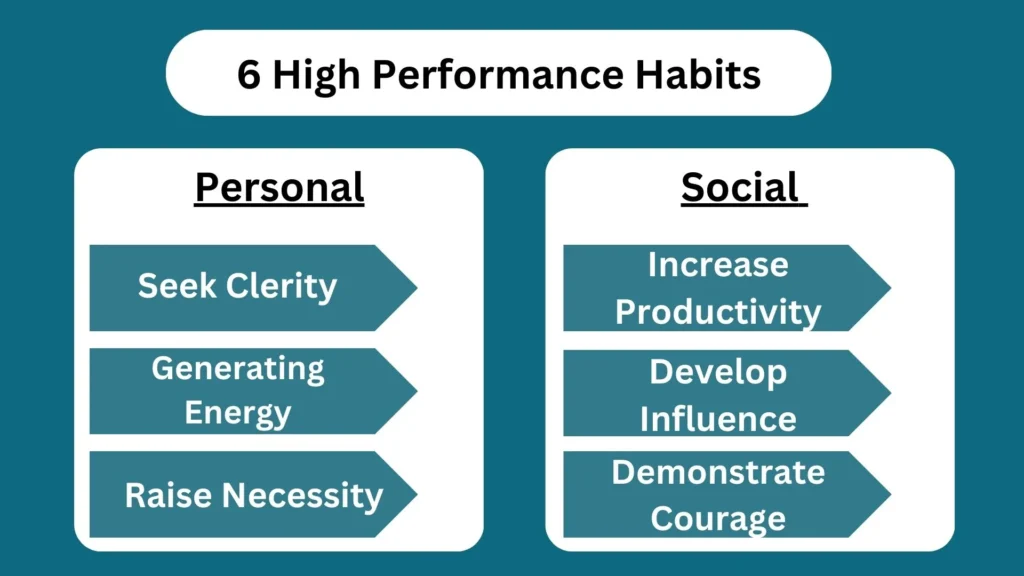High Performance Habits by Brendon Burchard is a self-help book that investigates the practices and habits of high performers.
Do you ever wonder what sets high performers apart from the rest? What exactly are these high-performance habits?
We all want to be high performing in every area of our lives. But how? Don’t worry; this book is about the art and science of practicing these proven habits to become high performers.
In this guide, I will turn over what are the six high performance habits. How can they transform your life? And how you can incorporate them into your daily routine to achieve your goals and aspirations.
Table of Contents
Overview
Throughout the book, Burchard explores the habits and behaviors that distinguish high performing individuals from others, providing practical insights and strategies for you to implement in your own lives.
This high performance habits book begins by introducing the concept of high performance and its significance in personal and professional growth. Burchard defines high performance as the ability to excel and achieve one’s goals consistently, emphasizing the importance of mindset, habits, and actions in this process.
The book is divided into three sections. In the first two sections, Burchard identifies six key habits that are characteristic of high performers. These habits, known as the HP6 model, can be classified into two types: personal and social.
The first section is about personal habits. The first three are personal behaviors centered on the individual;
- Seek clarity
- Generate energy
- Raise necessity
The second section is about social habits. These are;
- Increase productivity
- Develop Influence
- Demonstrate courage.
He examines each of these high performance habits, offering explanations, examples, and actionable steps to cultivate them in your daily lives.
The final section of the book focuses on amplifying and sustaining high performance over the long term. Burchard addresses common challenges and obstacles that you may encounter on your journey toward high performance, offering practical advice and strategies for overcoming them.
Overall, “High Performance Habits” is a comprehensive and insightful resource for everyone looking to realize their full potential, maximize their effectiveness, and achieve extraordinary results in their lives.
Discover more about best books on habits.
6 High Performance Habits
Let’s explore high-performance habits one by one.

Habit 1: Seek Clarity
In Brendon Burchard’s “High Performance Habits,” the first habit introduced is “Seek Clarity.”
Seeking clarity involves the persistent pursuit of understanding oneself, one’s objectives, and the path to achieving them. It’s about eliminating confusion and ambiguity to focus on what truly matters.
Brendon Burchard emphasizes the significance of seeking clarity as a high performance habit in every aspect of life. He suggests that clarity is not a one-time achievement but a continuous process of self-discovery and refinement. Burchard highlights the role of clarity in enhancing productivity, decision-making, and overall performance.
“High performers are clear on their intentions for themselves, their social world, their skills, and their service to others.”
Here, Burchard introduces the concept of the Future Four, comprising Self, Social, Skills, and Services.
I. Self
Clarity starts with knowing yourself. Burchard states that,
“Be more intentional about who you want to become. Have a vision beyond your current circumstances. Imagine your best future self, and start acting like that person today.”
High performers are very clear about themselves. Seeking clarity enables you to understand your strengths, weaknesses, and areas for improvement and stimulate personal development.
Question yourself about aspirational terms that represent your future self.
- Who am I?
- What are my strengths and weaknesses?
- What do I wish to be in the future?
Brendon gave an example of a woman who characterized herself as “alive, playful, and grateful.” These words express your values and goals. By asking yourself how you would define your future self, you can acquire clarity about who you want to be.
II. Social
Social interactions and connections has an important role in well-being and success. Clarity in social interactions helps in building meaningful connections, fostering empathy, and nurturing healthy relationships. Brendon says,
“High performers… have clear intentions about how they want to treat other people… In every situation that matters, they know who they want to be and how they want to interact with others.”
Ask yourself, “How can I be a good person or leader in this upcoming situation?” or “What does the other person need?” or “What kind of tone or mood do I want to set?”
Reflecting on these questions enables you to be more deliberate in your interactions with others, preventing you from solely reacting or becoming defensive during critical or tense moments.
III. Skills
Developing skills is essential for professional growth and success. Seeking clarity about your skill development, goals, and strategies will empower you to acquire new competencies and excel in your chosen fields.
IV. Services
Contributing to others and making a positive impact on society brings fulfillment and purpose. Clarity regarding how one can best serve others aligns actions with values and promotes a sense of fulfillment. Brendon states,
“What will provide the most value to those you serve? This is a question high performers obsess about.”
He observes that individuals who underperform often prioritize self-interest over serving others. Their priorities are more focused on meeting their own needs and desires than on those they serve.
Habit 2: Generating Energy
In “High Performance Habits”, the second habit, “Generate Energy,” is extensively explored, emphasizing the crucial role of energy in achieving peak performance.
Burchard delves into the various dimensions of energy—physical, mental, emotional, and spiritual—and provides insightful strategies for cultivating and harnessing energy effectively.
Burchard discusses how neuroscience supports this tendency. According to National Institute of Health, exercise causes the brain to generate learning and memory neurons.
I. Physical Energy
Firstly, Burchard discusses the significance of physical energy, emphasizing the value of leading a healthy lifestyle. He advocates for regular exercise, adequate sleep, and proper nutrition as foundational practices for optimizing physical vitality.
Burchard emphasizes that physical well-being lays the groundwork for sustained energy levels, that enable individuals to tackle challenges with flexibility and strength.
II. Mental Energy
Secondly, Burchard explores mental energy and its impact on cognitive function and creativity. He advocates for practices such as mindfulness meditation, continuous learning, and mental stimulation to sharpen mental acuity and foster innovation.
Adopting a positive outlook on life can help you to promote the growth of mental energy. This positive view enables high performers to be more energetic and positive.
Burchard underscores the importance of managing distractions and maintaining focus to preserve mental energy reserves by stating that,
“The simple act of deliberately pausing between activities and setting intentions will help you gain more presence in your life.”
Each day consists of a sequence of shifts from one phase to another. For instance, waking up marks the transition from sleeping to being active. People who have the habits of high performance recognize their transition very well. The key to boosting energy lies in identifying the regular transitions you encounter daily. Then, set an intention for each transition, focusing on:
- What kind of energy do you want to bring into the next activity?
- How can you improve your performance in the upcoming task?
- What methods can you use to enjoy the process more?
High performers are adept at managing their transitions. They often pause briefly, shut their eyes, or engage in meditation to provide themselves with a brief mental break. This release of tension allows them to shift their focus from one task to the next more effectively.
Habit 3: Raise Necessity
“High Performance Habits” introduces the concept of “Raise Necessity” as a fundamental habit of individuals who consistently achieve high levels of success. Prior to any big action, high performers emphasize the psychological necessity of why they need to do it effectively.
Brendon mentions that he worked with an Olympic gold medalist sprinter. One time, I said, “When you’re lined up against all these other sprinters, and the difference in winning and losing is a hundredths of a second, how do you know who is going to win?” He said, “I would put my money on the person who says, ‘I’m going to do this for my mom.'”
Burchard further explores this concept by identifying four key factors—identity, obsession, duty, and urgency—that contribute to the creation of performance necessity among high performers. The first two are internal forces, while the last two are external forces.
I. Identity
It means developing an internal standard for excellence. High performers align their goals with their sense of identity. They perceive their objectives not merely as external targets but as integral components of who they are.
By integrating their goals into their self-concept, they elevate the necessity of achieving them.
II. Obsession
High performing individuals demonstrate an unwavering obsession with their goals. They immerse themselves fully in their pursuits, constantly strategizing and seeking ways to advance. This obsession intensifies their sense of necessity.
III. Duty
High performers perceive the pursuit of their goals as a duty rather than a choice. They feel a profound responsibility to themselves, their loved ones, or a higher purpose to fulfill their potential and make a meaningful impact. This sense of duty elevates the necessity of their actions.
“High performers often feel the necessity to perform well out of a sense of duty to someone or something beyond themselves. Someone is counting on them, or they’re trying to fulfill a promise or responsibility.”
IV. Urgency
High achievers possess a sense of urgency. They use genuine deadlines to motivate themselves to achieve better. They cultivate a heightened sense of urgency around their goals and tasks. They recognize the fleeting nature of time and the importance of taking immediate action to make progress.
High performers credit commitments, whether to their teams, managers, or customers, to establish real deadlines. These commitments serve as a powerful tool, creating urgency and driving action towards achieving goals.
Habit 4: Increase Productivity
Productivity is another key high performance habit. Burchard defines productivity not merely as the ability to complete tasks but as the capacity to accomplish meaningful goals efficiently and effectively—individuals who perform highly understand the importance of maximizing their output while minimizing wasted time and effort.
High performers are also more productive because they anticipate five steps ahead and plan accordingly. They are thinking of the five moves that will get them there, and so to avoid distraction.
Brendon suggests the key factor to increase productivity.
I. Prioritizing Tasks Effectively
Prioritization is a cornerstone of productivity. Individuals who have the habits of high performance discern between urgent and important tasks, allocating their time and resources accordingly. They tackle high-priority tasks first, ensuring that they make meaningful progress towards their goals each day.
For example, successful insurance agents prioritize their costumers services.
II. Managing Time Efficiently
Time is a finite resource, and high performers recognize the importance of managing it judiciously. They employ strategies such as time blocking, batching similar tasks together, and minimizing multitasking to maximize their productivity.
III. Fostering Focus and Concentration
In a world full of distractions, being focused is essential. High performers cultivate the habit of deep work, immersing themselves fully in tasks that require their undivided attention. They eliminate interruptions, create a productive work environment and harness the power of mindfulness to stay present and engaged in their work.
“Increase Productivity” stands as a foundational habit of high performers, enabling them to achieve exceptional results and unlock their full potential.
Habit 5: Develop Influence
Burchard defines Influence as the capacity to impact others positively and effect change in their thoughts, feelings, and behaviors. People with high performance habits understand that Influence is not merely about persuasion or manipulation but about fostering genuine connections and inspiring trust and respect.
High performers gain Influence by teaching others how to think and pushing them to grow. When you teach individuals how to think, you fundamentally alter their lives. They consistently guide those around them to think differently – because when you positively influence someone else’s thoughts, you wield significant Influence.
High performers often use phrases like “Consider it like this”, “What if we tried this approach?” or “How do you feel about this?”
There are certain key strategies to develop Influence:
I. Building Strong Relationships
High performers recognize the importance of cultivating meaningful connections with others. They invest time and effort in building rapport, demonstrating empathy, and fostering trust.
People with high performance habits can regularly build long-term close bonds, regardless of their success level. According to the American Psychological Association‘s 2016 survey, only half of Americans feel appreciated by their superiors, leading Brendon Burchard to argue that half of leaders are underperforming.
II. Demonstrating Expertise and Credibility
Influence is built on a foundation of expertise and credibility. High performing individuals continually seek to expand their knowledge and skills, positioning themselves as authorities in their respective fields. Through their mastery of subject matter and track record of success, they earn the respect and admiration of others.
III. Effective Communication Skills
Communication lies at the heart of Influence. High performers excel at articulating their ideas clearly and persuasively. They listen actively, seek to understand diverse perspectives and adapt their message to their intended audience. By communicating with authenticity and conviction, they inspire others to action.
Developing Influence emerges as a defining high-performance habit. It enables you to shape your environment, inspire others, and drive meaningful change.
Habit 6: Demonstrate Courage
Demonstrating Courage emerges as a pivotal habit among high performers, as outlined in Brendon Burchard’s “High Performance Habits.” Burchard states that high achievers consistently exhibit courage in the face of challenges, uncertainties, and fears.
Why is courage necessary for excellent performance? Because it inspires you to take courageous action in the face of danger or even fear. Brendon writes
“Courage is not fearlessness; it is taking action and persisting despite that fear… The more actions you take facing fear, expressing yourself, and helping others, the easier and less stressful these actions become…”
High performers understand that growth and progress often necessitate taking calculated risks and embracing discomfort. They embody the courage to pursue their aspirations with unwavering determination, regardless of setbacks or criticism.
Brendon recommends a few things we can do to display courage.
I. Honoring the struggle
It reflects the idea that setbacks, failures, and difficulties are integral parts of the journey toward success. High achievers see these challenges as opportunities for growth and learning, not hurdles to be avoided.
II. Sharing one’s truth and ambition
It involves being authentic and transparent about your goals, values, and aspirations. High performers are unapologetic about their dreams and desires, openly expressing their vision for the future and the steps they’re taking to realize it.
By sharing your truth, you inspire others to do the same and create a culture of openness, honesty, and collaboration.
III. Finding someone to fight for
It underscores the importance of having a sense of purpose beyond oneself. High performers identify causes, communities, or individuals they deeply care about and channel their efforts toward making a positive impact in their lives.
Final Words
In conclusion, the six high performance habits serve as the ultimate guide to achieving greatness. By cultivating clarity, generating energy, raising necessity, increasing productivity, developing Influence, and demonstrating courage, You can reach your highest possible achievement and succeed in each aspect of your life.
By integrating these high performance habits into your daily routines, you can elevate your performance, maximize your impact, and live a life of purpose and excellence.




